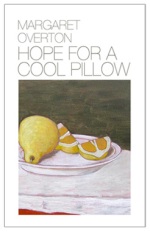 Hope for a Cool Pillow
Hope for a Cool Pillow
by Margaret Overton
Physician Margaret Overton experiences two sides of the same coin in Hope for a Cool Pillow, her new memoir, which tackles disparate views of healthcare.
 Overton, a Chicagoan whose first memoir, Good in a Crisis, was one of Chicago Book Review’s Best Books of 2014, examines the deaths of her parents, which she experiences both as a daughter and as a physician, one eye on the experience as a loved one, one eye on the experience as a medical professional. This dual view is at the heart of Hope for a Cool Pillow, which looks at the emotional, medical, financial, physical, legal, and logistical aspects of the end-of-life journey.
Overton, a Chicagoan whose first memoir, Good in a Crisis, was one of Chicago Book Review’s Best Books of 2014, examines the deaths of her parents, which she experiences both as a daughter and as a physician, one eye on the experience as a loved one, one eye on the experience as a medical professional. This dual view is at the heart of Hope for a Cool Pillow, which looks at the emotional, medical, financial, physical, legal, and logistical aspects of the end-of-life journey.
The book opens with a reminiscence of Overton’s early healthcare career as she shares a story from her first clinical rotation during her third year of medical school. Working with a 102-year-old patient named Esther, Overton admires her “quiet aplomb” and approves of the do-not-resuscitate order that would keep doctors from undertaking any emergency rescue measures to keep her alive. This, Overton thinks, “is the way to go”—death without extraordinary intervention to extend someone’s life. “A quiet death without fuss or muss.”
It is through this lens that we follow Overton on her dual journey, one of a healthcare professional, one of a daughter watching her parents come to the end of their lives.
Her father was the first of her parents to go. An orderly man, Carl “had an obsessive interest in end-of-life planning.” Here was a man who, every day for forty-five years, “timed his four-and-a-half-mile drive to and from work.” In 1997, Carl’s health went into decline. Over the next several months, Carl would be in and out of the hospital for various check-ups, surgeries, treatments, and chemotherapy. By Autumn 1998, he had died.
Twelve years later, Overton’s mother passed away, also after a period of declining health. Dementia set in, and during her last year of life, she succumbed quickly, a difficult death wherein pain “just gripped her and then let her go.”
During the twelve years that intervened between the passing of her father and her mother, healthcare had evolved such that hospice had become big business. While her father lay dying, Overton’s family dealt with one hospice nurse who took care of Carl for nearly three weeks. For her mother, seven different nurses cared for her over the course of nearly a month. It was an unwelcome change in Overton’s eyes, a transformation to a less personal, more clinical process that extended life without necessarily making end of life any better or any easier.

Margaret Overton
While we watch Overton deal with the deaths of her parents, we also see her grow in her career as a physician. We see her treat various patients, some of whom make it, some of whom don’t. We see her attend a program called “Managing Healthcare Delivery” at Harvard University, a course in which she quickly loses interest as she ponders the gulf between healthcare providers and patients, between for-profit and not-for-profit care, between easing death and extending life.
There is much to ponder in these pages. End-of-life planning—how we want our wills and finances to be structured, how we want our lives to end, how much medical intervention we wish to endure—is a tricky, personal issue. It’s one most of us don’t want to think about, not for ourselves, not for our parents. And, yet, with the rising cost of healthcare and with the expansion of life-saving measures, it’s something we must think about.
Overton’s story is interesting, if not perhaps somewhat fragmented. Told in a non-linear fashion, Hope for a Cool Pillow jumps around from topic to topic. It’s a little messy and convoluted. It feels a little foggy, as though Overton was struggling to come to grips with the various issues that she confronted during the decade or so covered in the book.
That might be a turn-off for some readers, but it’s not necessarily a flaw. In fact, one could argue that the wandering, choppy approach is just about as real as real can be: It mimics life.
Few of us have the luxury of dealing with the death of a parent in a bubble or a vacuum. The rest of life doesn’t stop while a parent is struggling with cancer or Alzheimer’s or heart disease. The world doesn’t stop turning while we endure the hefty tolls exacted by the process of dying and the aftermath of death.
Death is, for most of us, an uncomfortable topic. In Hope for a Cool Pillow, Overton has shared an intimate insider’s view of different sides of the healthcare equation. As such, it is a thought-provoking read. Perhaps not a comfortable read, but one that provides an opportunity to think about the unthinkable, opening the door for those discussions we know we ought to be having with the people we love.

March 2016, Outpost 19
Memoir
$16, paperback, 181 pages
ISBN: 978-1-937402-90-7
—Reviewed by Kelli Christiansen
Learn more about the author and the book.
